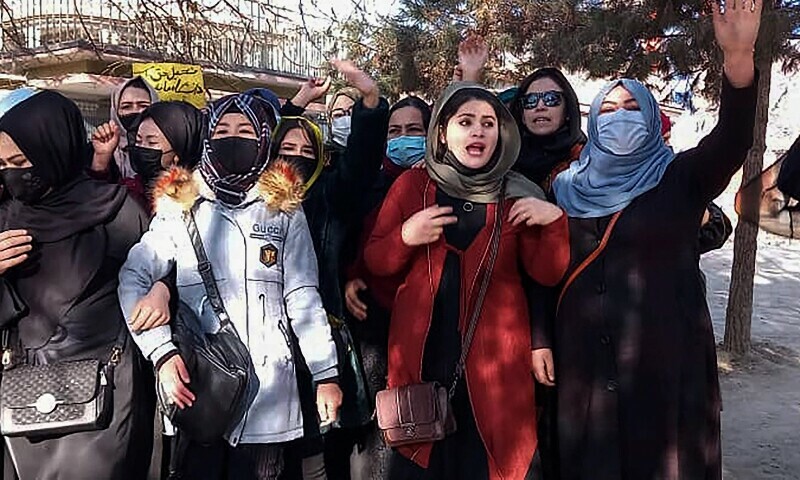By Rimsha Qasim
As the curtain almost falls on the two-year mark since the Taliban’s dramatic comeback, the irony is stark and unmissable: female students continue to be locked away from the halls of learning, as if education were a forbidden fruit. In a world where knowledge is power, Afghanistan stands as a unique testament to absurdity, being the sole nation that boasts of an outright embargo on educating its daughters. Despite relentless cajoling from local voices, international harmonies, and regional pressures, the wheels of progress seem inexplicably stuck in this unsettling episode. But wait, a twist in the tale emerges – recent whispers from within the corridors of power unveil a brewing rift, as some of the ruling gurus cautiously contemplate lifting this archaic blockade.
Echoes from the echelons of education bureaucracy resonate with promises of unlocked gates, inviting young minds to embrace the light of wisdom once again. Universities, they claim, have meticulously prepped themselves to swing open their doors to eager female scholars. Ah, but there’s always an “if” in this intricate puzzle. The leader of the Taliban, their compass and ruler, holds the reins to this tenebrous charade. Amidst the bureaucratic ballet, the Higher Education Ministry murmurs in unity – a chorus that harmonizes around the call for girls’ education to reclaim its rightful place. Yet, like a pendulum in suspense, the question lingers, swaying in the air – will the signal finally echo from the helm, the Taliban’s orchestrator-in-chief, Hibatullah Akhundzada?
The calendar pages turn, reminding us of the almost palpable heartbeat of change, the yearning for equality. The dilemma remains entrenched; it’s a play where actors and extras sit on a precipice, waiting for the director’s nod. Female students, brimming with aspiration, stand ready at the threshold, their futures dangling in a suspenseful narrative. It’s an odd spectacle, one where the keys to the door are tantalizingly close, yet clutched in hands that seem hesitant to let go. The corridors of academe hum with potential, classrooms adorned with possibility, yet a solitary figure stands between reality and the promise of progress. The dissonance between ideals and the ever-moving hands of time is palpable, a paradox that has become a nation’s silent symphony.
So here we are, a tale that’s as bewildering as it is poignant, a nation caught between history and its aspirations. As the second chapter in this newfound era approaches, the spotlight lingers on an irksome question – will this script unravel, giving young women their long-overdue chance to ink their narratives into the annals of education? The show must go on, they say, but will the curtain rise on a stage where education is a universal birthright, free from the shadows of gender? Only time will unfurl the tale, revealing whether this peculiar paradox becomes an epilogue or a new chapter yet to be written.
Ah, the ironies of official stances! It was a mere two years ago when the ban was hailed as a shield against the dreaded mingling of the sexes. Words swirled like an edict, claiming that certain subjects were treading on thin ice, skating dangerously close to the edges of Islamic principles. The grand vision promised the dawn of strict uniforms and meticulous codes, a makeover that would herald the triumphant return of girls to the sacred halls of education. Yet, here we stand, the seconds turning into years, and the grand promise echoes with a haunting silence.
What’s more intriguing is the subtle dance of discord behind these walls of governance. The orchestration of official symphonies reveals a tune of internal rifts and divergence of minds within the Taliban’s inner sanctum. The spotlight shifts to Zabihullah Mujahid, the chief speaker, who scrambles to douse the flames of discord, vehemently quashing any whispers of disagreement. Oh, the tight grip of power and dominion! It’s a demonstration, a vivid tableau of the ruler’s iron grip, casting a long shadow over every aspect of government affairs. This tussle between unity and division not only showcases the puppeteer’s mastery but peels back the curtain, exposing the tenuous autonomy of ministries as they tiptoe around pivotal decisions.
The path ahead seems paved with questions. Could Kabul untangle this web of gender separation and curriculum qualms? One wonders if a dash of deliberation, a sprinkle of compromise, and a dollop of creativity could concoct a solution. Instead, the perpetuation of a sweeping ban casts a formidable shadow, one that risks snuffing out the flickering flames of millions of young girls’ dreams. This grand saga of internal strife, unveiled like a theater of the absurd, can’t be shrouded in veils forever. The canvas of leadership reveals a fragile picture, an unsustainable paradigm where decisions are lost in the labyrinth of discord. The ticking clock casts a spotlight on the fraying edges, a pattern that could spell peril for the very entity that dances upon this precarious stage.
Subscribe our website for latest updates:
https://republicpolicy.com/shop/
Read More
















